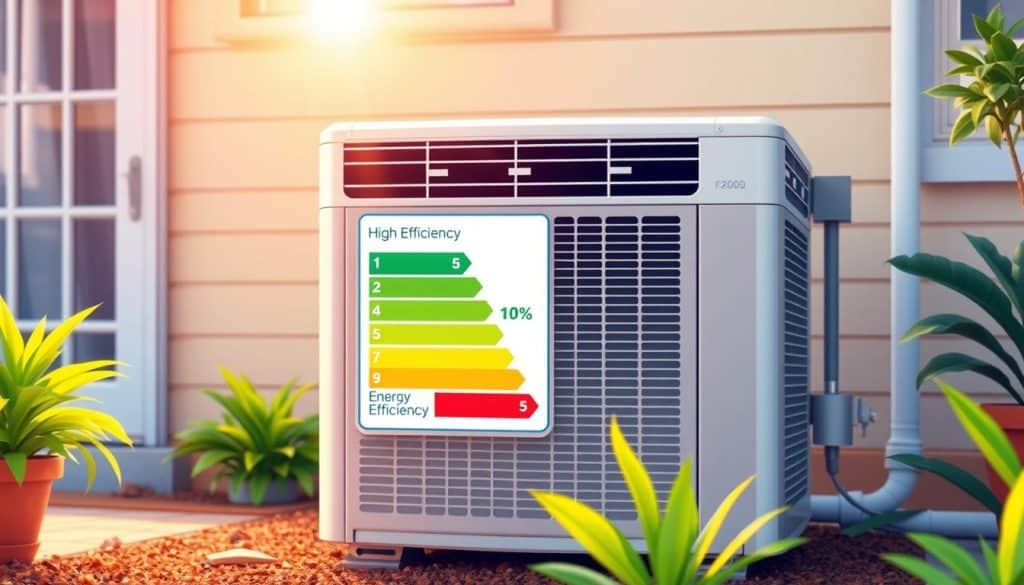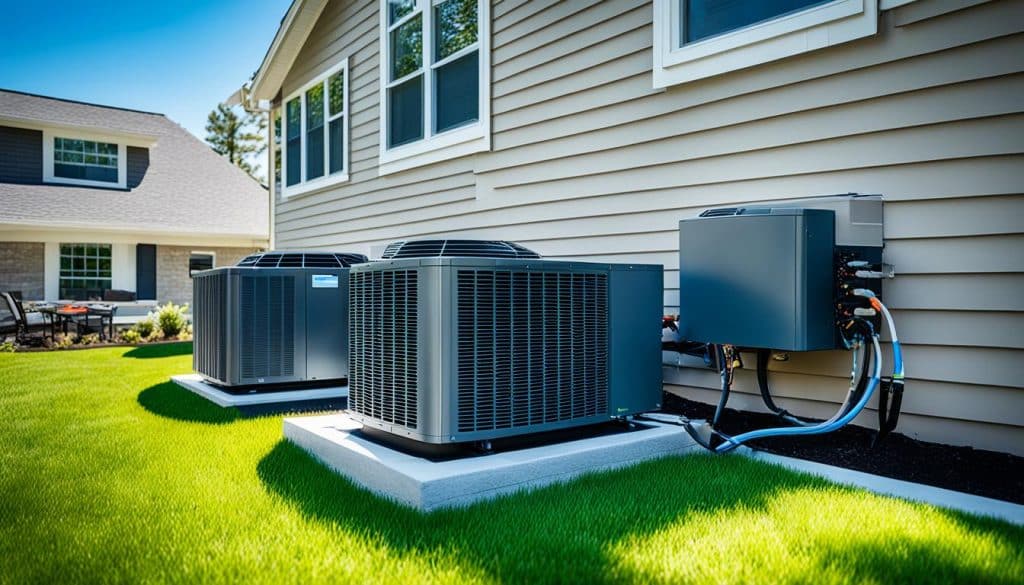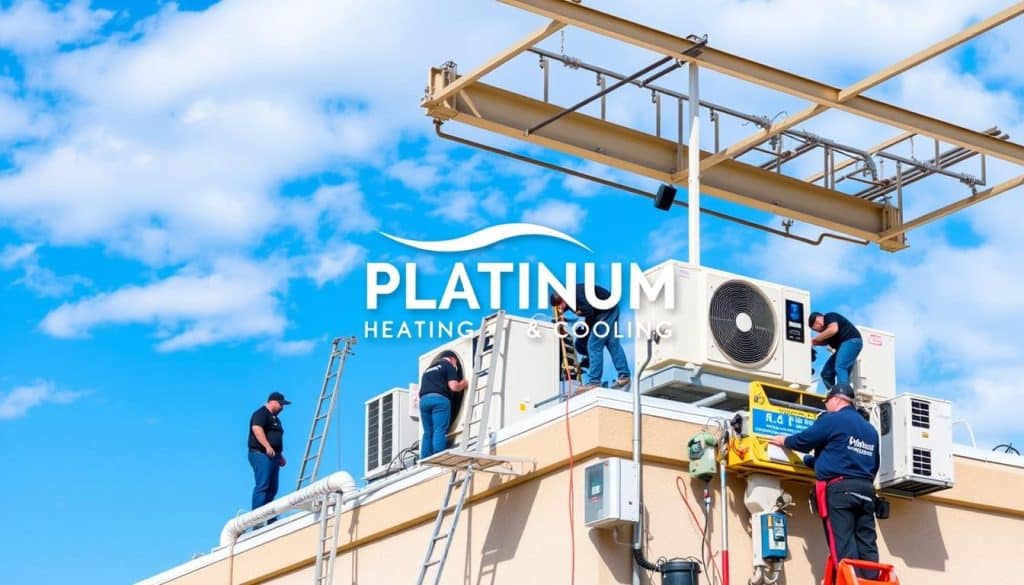Table of Contents
Thinking about investing in comfort but unsure of the cost? Knowing what affects AC installation costs can save you money. Whether it’s for your home or a new business, many things can change the price. Let’s explore these factors together. When planning your budget, it’s important to understand what factors affect the cost of AC installation? to avoid unexpected expenses.
Key Takeaways
- AC installation costs vary by the unit’s size and capacity.
- Energy efficiency (SEER ratings) significantly impacts long-term expenses.
- Type of air conditioning system determines initial and ongoing costs.
- Complexity of installation, including existing ductwork, can affect pricing.
- Contractor expertise and labor costs also play crucial roles in the overall expense.
- Choosing a trusted contractor like Platinum Heating & Cooling ensures quality and transparent pricing.
Size and Capacity of the AC Unit
Understanding your AC unit’s size and capacity is key for top performance and efficiency. When picking an AC unit, the home’s size and ductwork complexity are crucial. These factors guide your choice.
Importance of Proper Sizing
Getting the AC unit size right is vital. It ensures your system cools your home well without overloading. An efficient AC system must match your home’s needs to prevent issues like frequent cycling and uneven temperatures.
In new construction, precise sizing is essential. Accurate measurements help your system work efficiently, no matter your home’s size.
Common Sizes and Costs
Residential AC units come in sizes from 1.5 to 5 tons, measured in BTUs per hour. These sizes fit different home sizes and cooling needs. The cost of AC units varies, starting at $2,500 for smaller units and going up to $6,200 or more for larger or advanced systems.
Choosing the right AC unit size affects both upfront costs and long-term savings. It helps keep your AC system energy-efficient.
Energy Efficiency Rating (SEER)
The Seasonal Energy Efficiency Ratio, or SEER, is key to knowing how well an air conditioning system works. This rating affects your energy bills and how much you save.
Understanding SEER Ratings
SEER ratings show how efficient an air conditioning unit is. The higher the rating, the better it is at saving energy. Most systems have a SEER of 13, but top-of-the-line ones can go up to 27.
Choosing a higher SEER-rated unit for your AC repair & install can really cut down on energy use at home.
Long-term Savings
Even though high-SEER units cost more upfront, they save a lot on energy bills in the long run. This is especially true for people living in hot places or using their AC a lot.
Joining an HVAC maintenance program can also help your AC system work its best. This means you get the most out of its high SEER rating.
Type of Air Conditioning System
Choosing the right air conditioning system is important. There are many types to fit different needs and budgets. Let’s look at three popular ones.
Central AC Systems
Central AC systems are common in American homes. They are efficient and cool large areas well. The cost is between $2,900 and $9,000.
They need a lot of ductwork but work great with heating systems. Keeping them in good shape is key.
Ductless Mini-Split Systems
Ductless Mini-Split Install systems are becoming more popular. They are flexible and cool efficiently, even without ductwork. Prices range from $1,900 to over $16,100, based on the number of units needed.
They are easy to install and offer targeted comfort in different parts of your home.
Heat Pumps
Heat pump systems do both heating and cooling. They are a good choice for all-year climate control. Costs vary from $4,000 to $12,000+ based on the model and size.
They are perfect for those who want one system for both heating and cooling. Working with a trusted service like Platinum Heating & Cooling gives you access to many options and expert care.
Existing Ductwork and Installation Complexity
Installation complexity depends a lot on your home’s layout. If your home has tight crawlspaces, hard-to-reach spots, or needs new wiring and ducts, the job gets harder and pricier. Such projects need careful planning and skilled hands.
Platinum Heating & Cooling carefully checks these factors to give you the right price and a solid install. They focus on every detail, from humidifier install and service to keeping your air clean. This ensures your installation fits your home perfectly.
Labor Costs and Contractor Expertise
When you think about getting an AC installed, knowing the labor costs in your area is key. These costs can change a lot based on where you live. It’s important to get quotes from local experts. Choosing HVAC experienced technicians means your installation will be done right and might avoid problems later.
It’s also important to look at what companies offer for commercial HVAC service & install. Reputable companies give warranties and guarantees. This shows they’re reliable and do quality work. Even though cheaper labor might seem good, paying for skilled contractor expertise can save you money and trouble in the long run.
Conclusion
Knowing what affects AC installation costs is key. The AC unit’s size, energy efficiency, and installation complexity all matter. Choosing a reliable AC system means long-term comfort and efficiency in your home.
Energy efficiency, shown by SEER ratings, helps save money now and later. It’s important to pick the right air conditioning system for your needs. This could be a central AC, ductless mini-split, or heat pump.
The cost of labor and the contractor’s skill also impact the installation’s quality. Platinum Heating & Cooling offers expert HVAC installation services. Joining a maintenance program can also improve your system’s performance and lifespan.
For custom solutions, contact Platinum Heating & Cooling at (616) 229-0444 or email office@platinumheatingmi.com. Professional services help create an energy-efficient home.
FAQ
What factors affect the cost of AC installation?
Why is the size and capacity of the AC unit important?
How do SEER ratings affect long-term savings?
What are the common types of air conditioning systems?
FAQ
What factors affect the cost of AC installation?
Several things can change the cost of AC installation. The size and capacity of the unit, its energy efficiency rating (SEER), and how complex the installation is matter. The brand of the AC, the state of the ductwork, and any extra needs also play a role.
Why is the size and capacity of the AC unit important?
The right size AC unit is key for comfort and efficiency. The wrong size can cause problems like uneven temperatures or too much humidity. Units for homes usually range from 1.5 to 5 tons, costing between $2,500 and over $6,200.
How do SEER ratings affect long-term savings?
SEER ratings show how efficient an AC unit is. Higher ratings mean better efficiency and lower energy bills. Even though they cost more upfront, they save money in the long run, especially in warm places or when used a lot.
What are the common types of air conditioning systems?
There are a few main types of AC systems. Central AC systems cost between $2,900 and $9,000. Ductless mini-splits range from $1,900 to over $16,100, depending on the number of units. Heat pumps, which heat and cool, cost from $4,000 to over $12,000.
How does the condition of existing ductwork affect installation costs?
The state of your ductwork greatly affects installation costs and efficiency. Fixing leaky or poorly insulated ducts may raise the initial cost but is crucial for good performance. The complexity of the installation, like hard-to-reach spots or rewiring, also adds to the cost.
What role do labor costs and contractor expertise play in AC installation pricing?
Labor costs and the contractor’s skill are important but can vary. They depend on where you are, the technician’s experience, and the company. Good work from skilled contractors ensures your system works well and can save you money. It’s also wise to look at the company’s reputation and if they offer guarantees or warranties.
How does the condition of existing ductwork affect installation costs?
The state of your ductwork greatly affects installation costs and efficiency. Fixing leaky or poorly insulated ducts may raise the initial cost but is crucial for good performance. The complexity of the installation, like hard-to-reach spots or rewiring, also adds to the cost.
What role do labor costs and contractor expertise play in AC installation pricing?
Labor costs and the contractor’s skill are important but can vary. They depend on where you are, the technician’s experience, and the company. Good work from skilled contractors ensures your system works well and can save you money. It’s also wise to look at the company’s reputation and if they offer guarantees or warranties.



